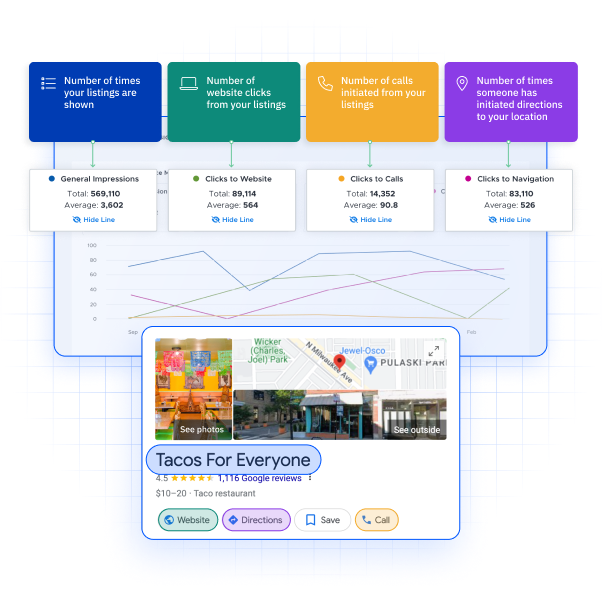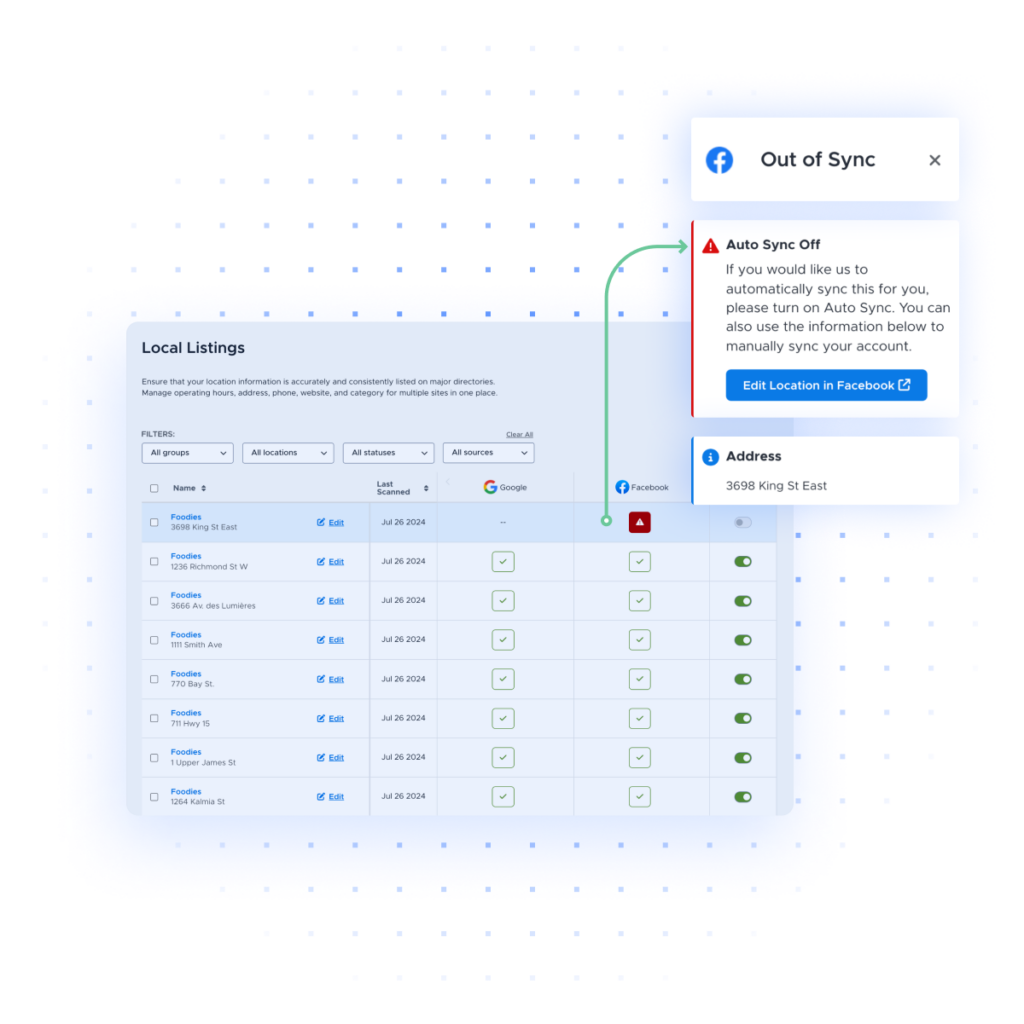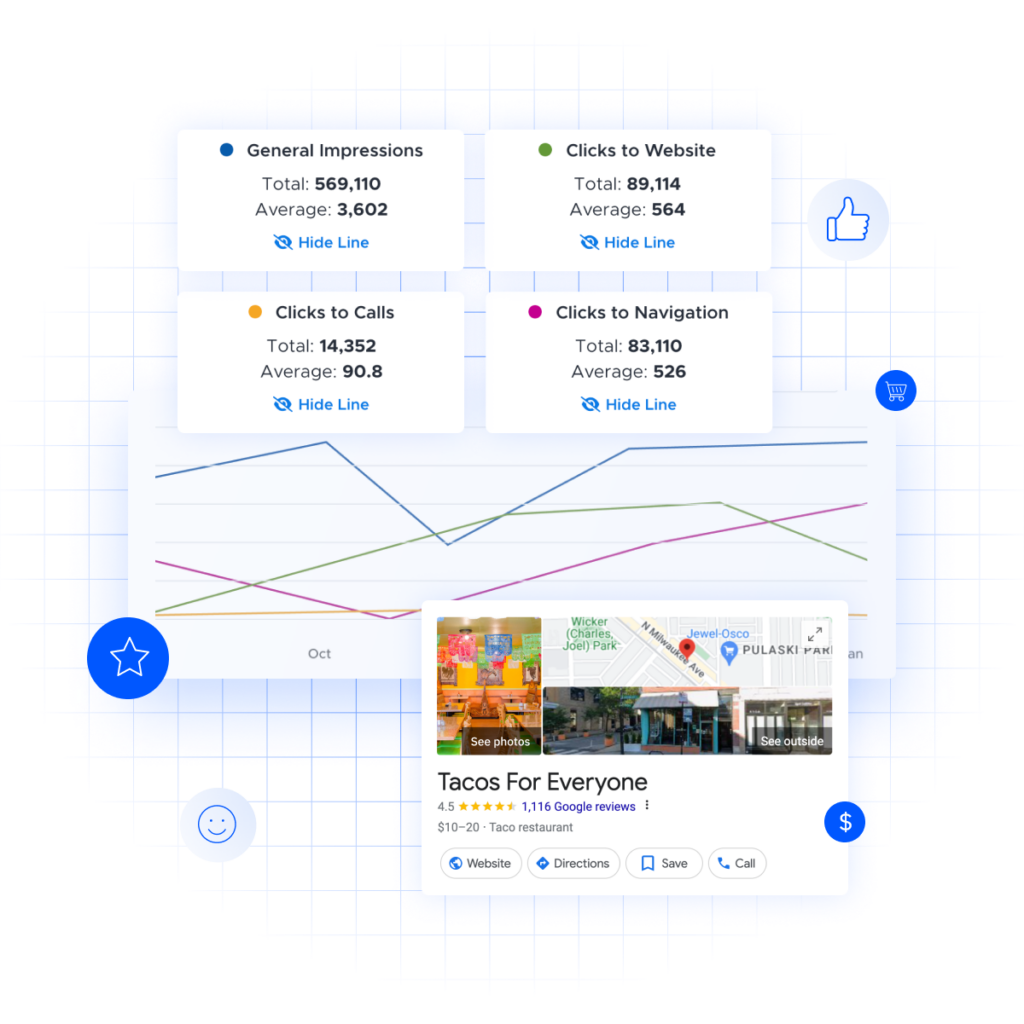Leverage Local Business Listings to Attract New Customers
Local business listings play a vital role in driving organic revenue by improving your online brand visibility. Ensure new customers can find your business online by maintaining complete and recent listings’ information across the web and optimize your listings performance.
In today’s digital age, local business listings have become a cornerstone for brands looking to attract customers locally. These listings are essential for boosting your online presence and ensuring potential customers can easily find you. But what exactly are local business listings, and how can brands leverage them as part of their acquisition strategy? In this article, we’ll explore everything you need to know, from the benefits of having a local business listing to best practices in managing and optimizing them at scale.
What Are Local Business Listings?
Local business listings are online entries that provide essential information about your business, such as the name, address, and phone number, also known as NAP. These listings appear in various online directories, search engines, and platforms, allowing customers to discover and connect with your local business. Common platforms where these listings appear include Google My Business, Apple Maps, Yelp, Bing Places, and Facebook.
These listings often include additional details such as business hours, services offered, customer reviews, and images, helping potential buyers get a comprehensive view of your business. Essentially, a local business listing serves as your brand’s digital footprint in the local online marketplace.

Why Are Local Business Listings Important?
First and foremost, local business listings help increase your online brand visibility, making it easier for potential customers to find you. 97% of consumers search online to find a local business. When your business information appears in local search results, it directly impacts the likelihood of attracting new customers who are actively searching for the products or services you offer.
Moreover, accurate and consistent listings across various platforms boost your credibility and trustworthiness. If your business details are correct and match across all platforms, it signals to both customers and search engines that your business is legitimate and reliable. Inconsistent information, on the other hand, can lead to confusion, a decline in search rank, and missed revenue opportunities.
What Are the Benefits of Local Business Listings?
Local business listings provide a multitude of advantages that can significantly boost your business’s online presence and organic pipeline.
Improved local SEO: Local business listings contribute to your search engine optimization (SEO) efforts, especially in local searches. The more accurate and consistent your listings are, the higher your chances of ranking well in search engine results pages (SERPs).
Increased traffic and sales: With higher online visibility, your local brand is more likely to generate more website visitors, calls, and foot traffic, leading to increased sales and revenue.
Decrease ad spend: When you optimize and manage your local business listings, they rank higher in search results. Increased organic traffic can reduce the need for expensive advertising campaigns and save your business money.
Outrank your competition: Being visible in local search gives you a significant edge over your competitors who may not have optimized their listings, helping you stand out and attract more customers.
Trust and Credibility: A well-maintained local listing with positive ratings, flattering reviews, and accurate information boosts your brand reputation and instills confidence in potential customers.
In summary, local business listings are a powerful tool for boosting your online presence, driving organic traffic, and building trust with potential customers, all while providing a competitive edge and reducing marketing costs.
How to Create a Local Business Listing?
Creating a local business listing is a straightforward process, but it requires careful attention to detail to ensure that you include complete and accurate information that will boost your search results.
Focus on the directory: Instead of spending efforts on trying to get listed everywhere possible, focus on the directories that matter the most. According to local SEO statistics, roughly 75% of new business is influenced by only a handful of business review sites and directories: Google, Facebook, Yelp, Tripadvisor, Apple Maps, and Bing Maps.
Additional Tip: When managing local listings, it’s essential to prioritize directories that rank highly in “near me” search results. To identify these directories, start by conducting a “near me” search related to your business. For example, a Google search for “hotel near me” might highlight top directories like Tripadvisor, Yelp, and Foursquare. This is a great way to increase the chances that people will find your business.
Ensure NAP consistency: Your business name, physical address, and phone number should be the same across all your business citations. This will inform search engines that your business is trustworthy and boost your rankings.
Provide as Many Details as Possible: Supply as much business information as possible, such as business description, category, operating hours, website, services offered, and high-quality images, to give potential customers a complete view of your business.
Maintain positive ratings and a steady stream of positive reviews: Regularly encourage satisfied customers to leave positive reviews and promptly address any negative feedback to build and sustain a strong online reputation.
The Importance of Local Business Listing Management
Once your listings are created, managing them is crucial. Regularly updating your listings ensures that all information remains accurate, which is essential for maintaining customer trust and improving your local SEO. This management also involves responding to customer reviews, both positive and negative, to show that you value customer feedback and are actively engaged with your audience.
Ignoring your listings can result in outdated information, negative customer experiences, and a drop in search engine rankings. Therefore, local business listing management should be an ongoing task for any business looking to maintain a strong local presence and increase organic revenue.
How to Optimize Your Local Business Listings
Optimized local business listings are key to improving your local search rankings and attracting new customers to your business. According to Google, customers are 70% more likely to visit and 50% more likely to consider purchasing from businesses with a complete Google local business listing. When looking to optimize your business listings, focus on:
Consistency: Ensure that your business information is consistent across all platforms. Inconsistencies can confuse customers and harm your local SEO efforts.
Accuracy: Verify your locations and provide as much information about your business as possible. Update your hours of operation regularly, including special hours for holidays and events.
Publish Google Posts: Use Google Posts to share updates, promote special offers, and highlight events. Regularly updating your profile with posts keeps it fresh and complete, helping to strengthen your local presence and attract more customers.
High-quality images: Add professional photos of your business, products, or services to tell a story and make your listing more attractive. Appealing pictures will show shoppers that your business offers what they’re searching for.
Manage your reviews: Encourage satisfied customers to leave reviews after their visit. High-quality, positive reviews from your customers can improve your brand visibility in search. As part of your review management strategy, ensure that you are responding to their feedback right away, showing appreciation and care.
Utilize listings management software: Take advantage of listings management software to maintain and optimize your listings performance. For brands with multiple locations, managing their business information across the web is almost impossible and it bares a high chance of making a mistake that will cost them a drop in ranking.
Listing management software like InMoment allows multi-location brands to achieve accuracy and consistency in their listings at scale, rank higher in local searches, and generate more location visits.
How to Measure and Improve Your Local Business Listing Performance
Measuring the performance of your local business listings is key to increasing their positive impact on your revenue. By monitoring key metrics, you can make data-driven decisions to optimize your listings for better online visibility and customer engagement.
Traffic increases & customer actions: Keep a close watch on how customers interact with your listings. Monitor clicks, phone calls, and requests for directions to gauge interest and engagement. Analyze any spikes in website traffic or foot traffic to your physical location that can be directly linked to your listings. This helps in understanding how effective your listings management is, alongside your reputation management efforts, in driving potential customers to your business.

Local search rank: Track your local brand position in search results for specific keywords. Higher visibility means more potential customers discovering your business, leading to increased opportunities for conversion. Use tools, like InMoment’s Reputation Management Software, to monitor your rankings and track keywords that are driving traffic to your listings.

Review scores: Your average review ratings and the volume of reviews provide insight into customer satisfaction and the reputation of your brand. Keeping an eye on these metrics such as your reputation score, helps in identifying areas for improvement and allows you to further boost your listings performance.

Listings data in sync: Ensure all relevant information, such as business hours, address, and contact details, are up-to-date and consistent across all platforms. Regularly audit and update your business information, especially if there are business hour changes during the holidays to maintain a reliable online presence.

Improve Your Local Listings With InMoment
It’s clear that your local business listings have a direct impact on your organic revenue. Managing them to improve online brand visibility is crucial for attracting new customers. However, overseeing multiple locations can be challenging, making it easy to lose track of updates and consistency, which can result in a drop in your search rankings.
Ensure new customers can find your brand online by utilizing InMoment’s local listings management software to maintain complete and recent listings’ information across the web. Automatically push real-time changes, update business hours, add photos to your Google Business Profile, create relevant Google posts, ask and respond to reviews to gain more online visibility, increase organic sales, and decrease your ad spend.
References
safari digital. 19 Local SEO Statistics That Matter in 2024. (https://www.safaridigital.com.au/blog/local-seo-statistics/) Accessed 8/19/24.


